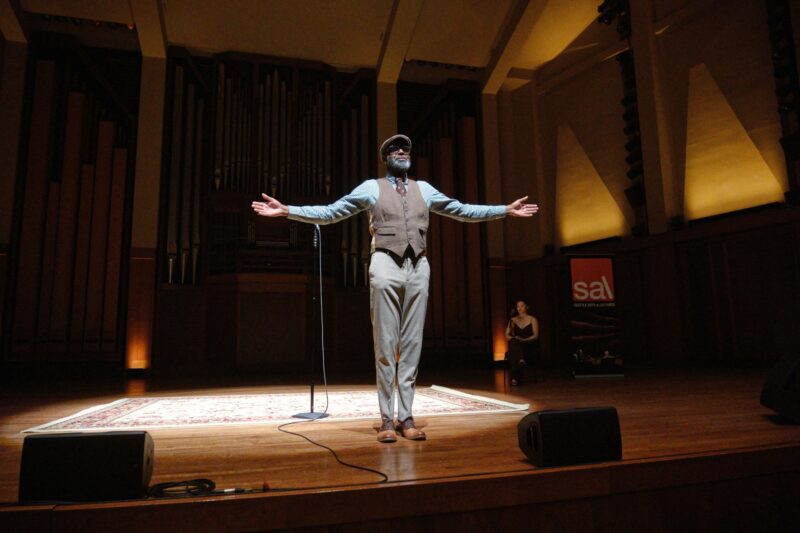Moth to a Flame: The Magnetism of the Moth Mainstage
Review of The Moth Mainstage at Seattle Arts and Lectures
Written by Aamina Mughal and edited by Vee Hua

From the moment the lights dimmed in Benaroya Hall and the anticipatory applause echoed throughout the room, I felt as though the rest of the audience knew something I didn’t, as someone who had never before been to a Moth Mainstage show. I would later discover that the secret they were all privy to was the specific type of magic that comes with sharing intimate stories. The Moth is an organization that emphasizes the importance of storytelling through their podcast and their live events. Moth events are generally composed of a few storytellers, and this event included five speakers, professional and otherwise. The atmosphere at the show was immediately larger than life, aided by the enigmatic host, Jon Goode.
Knowing that I had to write an article at the end of the show, I diligently pulled up a notes page on my phone and dimmed the screen brightness. My plans were foiled by Goode. He started the show by having the audience pull out their phones and turn on their flashlights, mimicking fireflies - and then asked us to turn them off. I’m immensely glad I did, as the stories told at the Moth can only be experienced with one’s full attention.
The theme of the show was “Coming Home,'' and Goode definitely imbued the audience with a love for our home, Seattle. At the beginning of the show, he recounted his journeys to Elliott’s Oyster House for seafood and to Easy Street Records for music. The first storyteller Morgan Balawage reaffirmed this theme, painting a vivid picture of herself at eighteen as a new arrival to Seattle, record shopping in the U-District, and making her first friend in the city at the Hurricane Cafe, which used to reside on the Denny triangle and closed in 2014. As a young adult, Balawage got a job at a bank in Wallingford. While working as a bank teller, she found herself in the midst of an armed bank robbery. However, even while she was being robbed she was most concerned with having to interact with her friend/coworker who her former boyfriend had cheated on her with. Her telling of the story, although terrifying in nature, was humorous and nostalgic. She expertly represents the way our personal relationships intertwine with each moment of our lives and moreover, the way that certain spots throughout the city can become sacred places. Her story was human, humorous, and uniquely relevant and charming to a Seattle-based audience. Balawage spoke to the audience as though speaking to an old friend, with familiarity and fondness.
Balawage was followed by Chiwoza Bandawe, whose story was about a former coworker who stole his mail and pretended that God was talking to Bandawe through him. Bandawe was endlessly endearing as he reflected on his struggles with his interpersonal relationships and people-pleasing during his doctoral residency. Throughout the story, repeated the line “And then I was very surprised,” which obviously added a layer of humor to his piece and at the same time represented his ability to craft a story intentionally. Bandawe was an intensely relatable and enthralling storyteller.
The last storyteller before the intermission was George Sumner, and I’ll admit that I was not the most receptive to his story at first. He described himself as intensely patriotic and proud of his service, coming home to anti-war protests after fighting in the Vietnam War. In the early parts of his story, I felt a tension within the audience as well. It was almost difficult to listen to him describe his steadfast loyalty to the army in the face of society telling him how heinous the war was.
However, Sumner eventually found affinity with other veterans who understood his internal turmoil. These companions helped him reconcile the atrocity of the war with the fact that he fought in it. Sumner joined a “veterans against the war” group and wore his t-shirt with that slogan until it was threadbare. Later in his life, he went on a pilgrimage to DC and he set the shirt down on the Vietnam War Memorial. Years later he saw that very same shirt at the Smithsonian museum. In just twelve minutes, Sumner clearly illustrated his journey grappling with his difficult personal history, the same way many of us must grapple with our history as a country. Sumner’s ability to show his transformation as a person as he transformed the opinions of the audience was very impressive. He clearly emphasized that patriotism does not mean ignorance or blind acceptance and masterfully captured what it means to have a complicated relationship with one’s home. Sumner got a standing ovation.
After an intermission, Susan Mueni told a story about her decision not to get married or have kids. Mueni always avoided the subject of marriage or kids with her boyfriend of four years, but by not revealing her desire not to get married or have kids, she ultimately caused him a lot of pain. She also discussed the importance of staying true to herself even when societal norms conflicted with her desires, and even when it meant losing someone important to her. Mueni’s storytelling was direct and informative, though somewhat sparse. While her story was hugely important, but while I remember being touched by the story, hers was a bit overshadowed by the other stories.
The last performer was poet David Whyte, who seemed to be the “headliner” of the show. Whyte had a very casual demeanor, as though he was in conversation with the audience rather than giving a presentation to us. He immediately displayed a masterful grasp on language as he painted a vivid picture of the Welsh countryside's winding mountain peaks, rolling hills, and crisp weather, all sparkling with life.
When Whyte arrived in Wales, he had come from doing animal research on the Galapagos, and he was settling into sheep farming. At the time, Whyte was trying to do what he had wanted to do all along – write – although he realized later that he might just not have been ready to write the stories he had wanted to. Whyte recalled meeting Michael, an older, less experienced farmer living in the mountains. He begrudgingly made tea for Michael when he caught him struggling to build a wall through his trailer window. Michael placed the cup on the wall, causing the wall to come down. Together, they rebuilt the wall, and thus began a friendship that would be quite formative to Whyte. When Whyte described their friendship, it seemed to glow, much like the fires they sat by in Michael and his wife’s cottage, when they discussed English poet William Blake and whether Blake actually talked to angels.
Eventually, Whyte moved away and a few years later, he heard that Michael had passed. In the month before his passing, Michael’s wife told Whyte, Michael had been in remission, and walked the grounds the two of them loved so much, talking to angels just like Blake. Whyte read us a poem that he wrote for his friend, “Elegy for Michael”, which heartbreakingly intertwined his love for Wales with his love for his friend. We as the audience came to understand that the idea of home for Whyte is the people he loves as much as it is the farm “passed down but never possessed.” The audience could feel the history of the mountainside dripping from Whyte’s account of it and in that way the expansiveness of his friendship with Michael. Whyte endeared Michael to the entire audience.
There’s something really special about the act of personal storytelling; it breeds compassion, empathy, and self-discovery, which is very obvious at Moth events. I fear that some of each story got lost because of how many performers there are, but I suppose that is all a part of being present in that moment of community. Some stories are bound to resonate more with a specific audience and because of that are more memorable although I believe that each story should be given the respect they deserve as intimate parts of someone’s life.
It was genuinely an honor to hear the stories that each person brought to Benaroya Hall. Each presenter brought something different but all the stories bursted with humanity and love. Host Jon Goode, should not be overlooked as a storyteller either, with his own anecdotes he created a sense of intimacy throughout the show. At the beginning of his story, Whyte made a remark about loving intimate venues, which was obviously ironic considering the grandness of Benaroya Hall. However, I do feel that it is a skill of Goode’s and all of the storytellers that they were able to make such an expansive place feel so intimate, with reverence for the human experience permeating through every inch of the venue.


